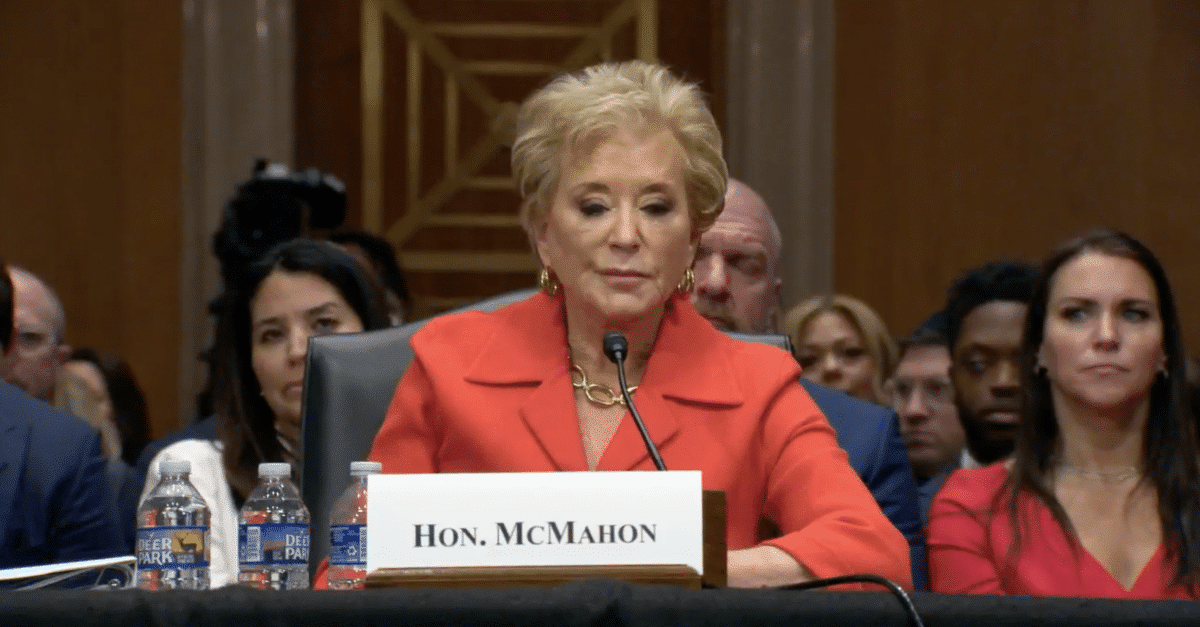Months after being named President Donald Trump’s pick to lead the Department of Education, Linda McMahon faced intense questioning from senators on Capitol Hill on Thursday regarding the agency’s future. The president has repeatedly expressed his desire to dismantle the department, calling it mismanaged and ineffective.
The Senate Health, Education, Labor and Pensions (HELP) Committee conducted the hearing, where McMahon—a businesswoman with close ties to Trump but no teaching experience—defended her nomination. Trump has criticized the Department of Education, referring to it as a “con job” and signaling his intent to reduce its influence.
Trump is expected to sign an executive order directing McMahon to submit a proposal for scaling back the department. He has suggested she should “put herself out of a job,” though the department’s elimination would require an act of Congress.
McMahon Defends Nomination Amid Protests
During her opening statement, McMahon was interrupted by protesters but maintained her stance on expanding school choice.
“If confirmed as secretary, I will work with Congress to reorient the department toward helping educators, not controlling them,” McMahon stated.
When questioned by HELP Committee Chairman Bill Cassidy (R-La.) and ranking member Sen. Bernie Sanders (I-Vt.), McMahon acknowledged that only Congress could abolish the department.
“It is set up by the United States Congress, and we work with Congress. It clearly cannot be shut down without it,” McMahon told Sanders.
However, McMahon expressed support for the president’s vision of returning education control to the states, reassuring lawmakers that states would continue receiving federal funding.
“We want to be working with Congress. We’d like to do this right,” McMahon said. “We’d like to present a plan that our senators and Congress can support for a better-functioning Department of Education. But it certainly requires congressional action.”
Concerns Over Diversity and Inclusion Policies
Sen. Chris Murphy (D-Conn.) pressed McMahon on Trump’s executive order prohibiting diversity, equity, and inclusion (DEI) programs and its potential impact on schools. Murphy referenced the closure of ethnic clubs at West Point and questioned whether public schools with similar clubs could face federal funding cuts.
McMahon responded that she would need to “assess” the situation before making a determination.
“You’re saying that it’s a possibility that if a school has a club for Vietnamese-American students or Black students, they could be at risk of losing federal funding?” Murphy asked.
“Again, I would like to fully understand what that order is and what those clubs are doing,” McMahon replied.
Murphy called her response “chilling,” warning that schools nationwide might be alarmed by her uncertainty.
McMahon’s Background and Ties to Trump
McMahon, co-founder and former president of WWE, was selected by Trump for her advocacy of parental rights in education and support for school choice. She previously led the Small Business Administration during Trump’s first term and has been a major donor to his political efforts. She also served on the Connecticut State Board of Education and holds a teaching certification from East Carolina University.
Despite her business background, McMahon’s nomination has been met with skepticism from Democratic senators due to her lack of experience in public education.
Past Controversies and Title IX Questions
McMahon’s tenure at WWE has also raised concerns. A 2024 lawsuit alleged that she and her husband, Vince McMahon, ignored sexual abuse claims involving the company’s executives. As Education Secretary, McMahon would oversee Title IX enforcement, which addresses sexual misconduct in education programs.
Sen. Tammy Baldwin (D-Wis.) referenced the lawsuit and questioned whether McMahon could be trusted to protect student survivors of sexual assault.
“They certainly can trust me to support them,” McMahon said. “You have my absolute commitment … [to] protect those investigations to make sure that those students are treated fairly.”
McMahon’s attorney has denied the lawsuit’s allegations, calling them “baseless.”
Future of the Department of Education
Supporters see McMahon as a disruptor who could lead efforts to reduce federal oversight of education. However, critics warn that dismantling the agency could harm millions of students relying on its programs, such as Title I funding for low-income communities.
As the confirmation process continues, McMahon’s nomination remains a flashpoint in the broader debate over the federal government’s role in education





